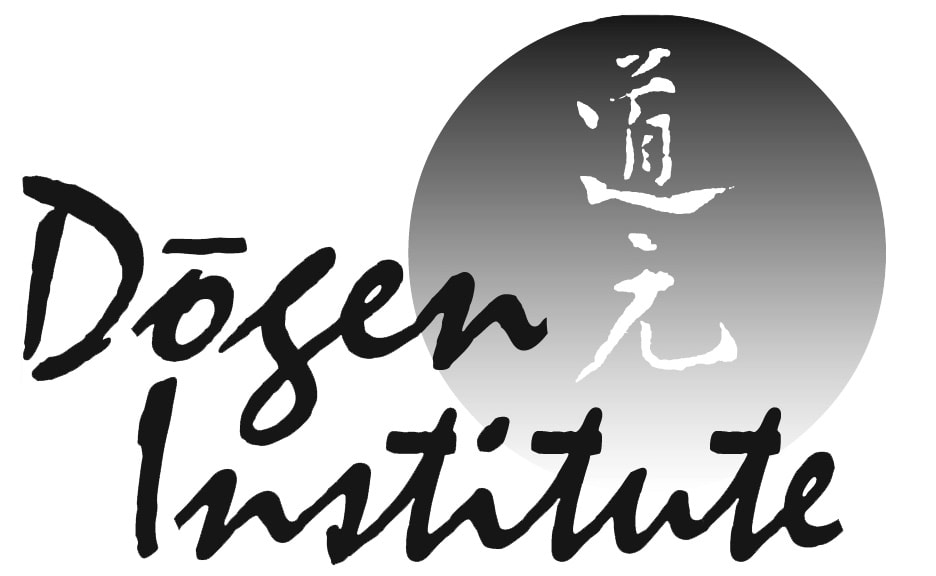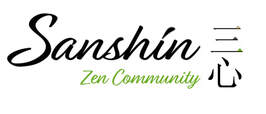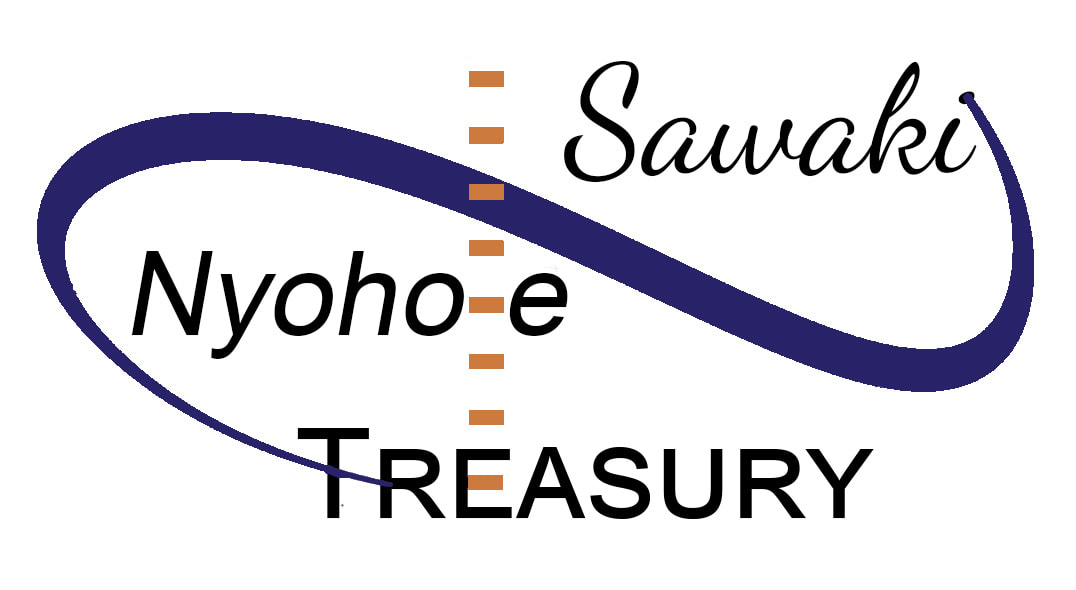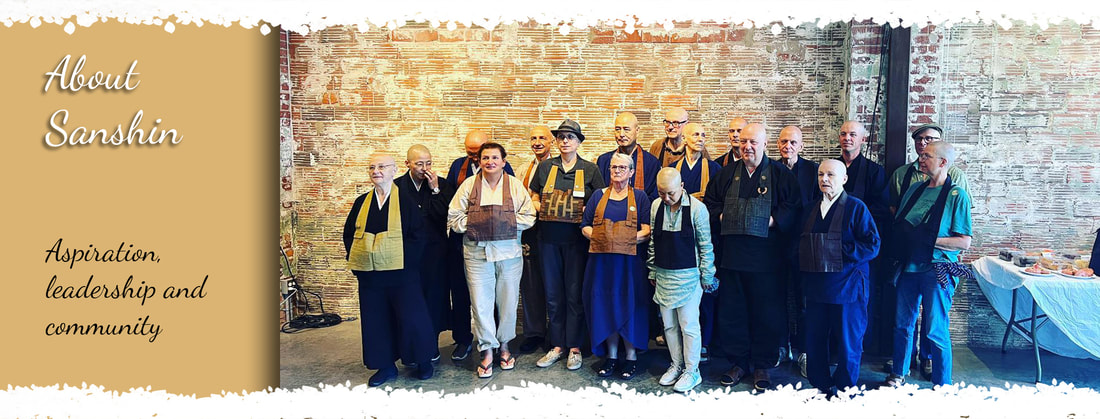MissionSanshin Zen Community exists to enable the investigation of interconnectedness as it manifests in community by engaging in six points of practice within the Soto Zen tradition:
Practice visionThe focus of our practice is the deep investigation of interconnectedness through the practice of shikantaza in the style of Uchiyama Roshi, deep study of Dogen Zenji’s teachings, and commitment to beneficial action, whether consisting of work within the temple or activities outside in the community. These three elements—zazen, study and work—are the foundation of our practice vision and calendar of activities. We see community as the ground for our practical study of interconnectedness, whether in residential practice (when available) or in our families, workplaces and neighborhoods..
Sanshin comprises three divisions. One is the temple in Bloomington, IN, which keeps Uchiyama Roshi’s style of practice alive primarily within our own lineage. Another is the Dogen Institute, which makes Dogen Zenji’s teachings and practice available to the wider world. The third is the Sawaki Nyoho-e Treasury, which preserves, embodies and transmits Kodo Sawaki’s nyoho-e teachings about sewing, wearing and encountering Buddha’s robe. Sanshin, its founder Okumura Roshi, his successor Hoko Karnegis, and many of their dharma descendants are recognized and authorized by the Soto Zen denomination in Tokyo and its North American headquarters in Los Angeles. History
Sanshin was founded in 1996 by Shohaku Okumura, a Soto Zen priest and respected translator of the thirteenth-century Japanese Zen master, Eihei Dogen Zenji. We're based at Shobozan Sanshinji 正法山 三心寺 in Bloomington, IN, where we offer opportunities for daily practice, weekly dharma talks, sesshin and retreats, and a three-month ango (practice period). Activities are open to anyone with a sincere interest in the practice of Soto Zen. We're largely a lay sangha, with most regular activities happening on weekday and Sunday mornings as well as occasional evenings in order to accommodate lives of work and family.
Okumura Roshi originally founded Sanshin in Iowa City, IA with the help of Taiken Yokoyama. Thanks to the efforts of sangha members, the land in Bloomington was purchased in 2001 and construction work began in winter of the next year. By August 2003, all community activity had moved to Bloomington. In 2005, Sanshin received authorization from the Soto Zen denomination as an official overseas temple, so it serves as an accredited site for ango (practice periods). Our complete lineage is here. |
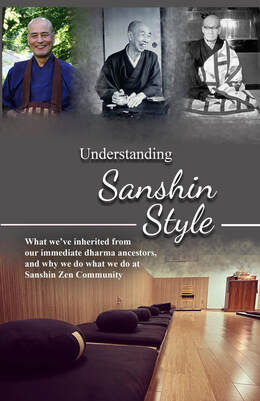
Free ebook for download:
Understanding Sanshin Style What we've inherited from our immediate dharma ancestors, and why we do what we do at Sanshin Zen Community. While it’s certainly possible to take an individual element of Sanshin style and investigate it on its own, the beauty and meaning of the practice container is in the interconnection and mutual support of the teachings, practices and attitudes that make up a coherent approach to the dharma. Listen to an extended interview with Okumura Roshi on the Wisdom Publications website. He tells stories of Sawaki Roshi and Uchiyama Roshi, and explains the emphasis on zazen over monastic rituals within our lineage, drawing parallels to both Dogen’s teachings as well his teachers’ own personal encounters with zazen.
Practice leadershipShohaku Okumura, Founder
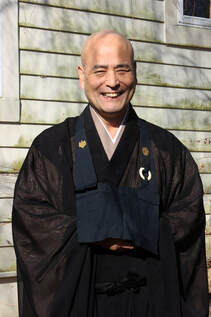
Shōhaku Okumura
Founder Shohaku Okumura, founder and abbot of Sanshin Zen Community, stepped back from day to day leadership in June, 2023. He was born in Osaka, Japan, in 1948. In 1970, he was ordained by the late Kosho Uchiyama Roshi, one of the foremost Zen masters of the twentieth-century. He received Dharma transmission from his teacher in 1975 and, shortly after, became one of the founding members of Pioneer Valley Zendo in Massachusetts. He returned to Japan in 1981 and began translating the works of Dogen Zenji, Uchiyama Roshi and other Soto masters from Japanese into English. In 1993, he moved back to the United States with his wife, Yuko, and their two children. He has previously served as teacher at the Kyoto Soto Zen Center in Japan and at the Minnesota Zen Meditation Center in Minneapolis, and was Director of the Soto Zen International Center in San Francisco for thirteen years. Today, Okumura Roshi is recognized for his unique perspective on the life and teachings of Dogen Zenji derived from his experience as both practitioner and translator, and as a teacher in both Japanese and Western practice communities. He has given lectures on the Shobogenzo and other foundational texts; transcriptions have appeared in Buddhadharma: The Practitioner's Quarterly, Dharma Eye, and Buddhism Now. He has also written or contributed to a number of books; the complete publication list is available from our Dogen Institute. Hoko Karnegis, Senior Dharma Teacher
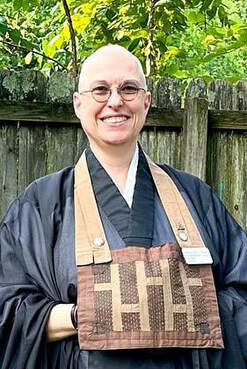
Hoko Karnegis
Senior dharma teacher Hōkō succeeded to the leadership of Sanshin in June, 2023. She was ordained as a novice by Shohaku Okumura in 2005, and she completed her shuso hossen that same year at Kogetsu-an in Shiga, Japan. She received dharma transmission in September, 2012 and completed zuise at Eiheiji and Sojiji in November of that year. She served as communications director at Hokyoji Zen Practice Community in southern Minnesota from 2013 to 2016 and as interim practice director at Milwaukee Zen Center from 2011 to 2013. She has served as an adjunct instructor at Lakeland College in Sheboygan, WI, where she taught Eastern Religious Traditions in the classroom and online, and now teaches Zen through Ivy Tech Community College's lifelong learning program. She is recognized by Sotoshu as nito kyoushi (second-rank teacher) and as a practitioner of baika, a type of Japanese Buddhist hymn created by Sotoshu in 1952. She is serving her second four-year appointment from Sotoshu as kokusai fukyoushi, or international teacher. Hosshin Shoaf
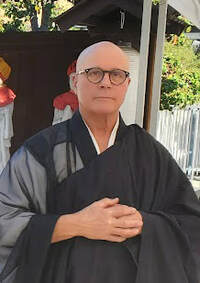
Hōsshin Shoaf
Shissui (work leader), Getting Started in Zen Practice facilitator, Thursday morning jikido/doan, Friday morning doshi. Hosshin Michael Shoaf found his way to meditation in his senior year in high school but didn’t really come to Zen practice until 1990 after reading Zen Mind, Beginners Mind. He moved to Bloomington in January of 1981 to enter Indiana University to study painting, sculpture and art history, finishing his studies in 1985. In 1986 he started a construction company that focused mainly on remodeling and renovation. Six years later Hosshin met Myoyu Andersen Roshi and began a 17-year practice with her that blended Soto and Rinzai Zen. At the same time he was part of a sitting group in Bloomington that later encouraged Okumura Roshi to consider that city as his base of operations. In 2009 he officially became a student of Okumura Roshi's at Sanshin. He ordained in 2013 and was shuso during the 2018 ango (practice period). These days, along with temple duties as work leader, Hosshin considers himself a cabinet and furniture maker, thoroughly enjoying the design process, finding it as satisfying as painting or sculpture. He lives in the woods in a 100 year old log cabin on the outskirts of town and is in the process of renovating it until he dies. Seigen Hartkemeyer
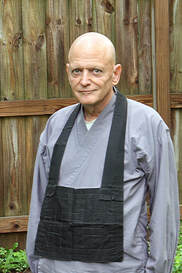
Seigen Hartkemeyer
Tuesday & Thursday morning doshi, occasional editorial assistant to Okumura Roshi Having first met Okumura Roshi at the “Many Faces of Dogen” conference at Zen Mountain Monastery in July 2004, Seigen moved to Bloomington in 2008 to practice with the Sanshin community. As a young man, he developed an interest in Taoism in college in the early 1970s and then shifted over to reading extensively on Zen Buddhism in the mid-1970s, taking up regular zazen practice following a first visit to the Paris Zen Temple in 1978. Through 1978-79 he would sit regularly Sunday mornings with a small, informal group of practitioners in Madrid, Spain, and he did his first summer sesshin with the sangha of the International Zen Association in the French Alps in August 1979. Having received precepts and the dharma name “Seigen” from Taisen Deshimaru in 1981, he was ordained two years later in that sangha. Throughout the 1980s and early 2000s, he participated in a number of sesshins at the Temple of La Gendronnière (including a five-month residence there in 1983) and in Quebec. Academically, he pursued grad studies in Spanish in Cincinnati and linguistics in Illinois and worked teaching (mainly) Spanish, including at the university level and in a local high school in Bloomington. Before moving to Indiana, he directed the Central Michigan Sangha, a sitting and dharma-study group on the Central Michigan University campus. He is now retired from professional teaching. Ritoku RObinson
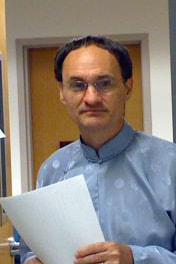
Ritoku Robinson
Sunday morning tea coordinator, occasional Sunday dharma speaker Ritoku is a Doctor of Philosophy in Philosophy and Religion having received said degree in 1993 from the California Institute of Integral Studies. From Indiana University he has earned a B.A. in Philosophy and a M.S. in Philosophy of Education. His undergraduate interest was Non-Western perspectives on Western Thought, those perspectives being Eastern Thought and indigenous philosophies such as may be found among Native Americans. He is of Cherokee descent and grew up with an interest in Native American culture. He has been active in the Native American Church, and has been educated in several forms of Native American religions. In 1988 he taught at the Rough Rock Demonstration School in the Navajo Nation. This school was the first Native-American-run school with a cross-cultural curriculum that included Navajo culture, language and religion. After this he served in the Peace Corps teaching philosophy and social science at the National University of Samoa. When living in San Francisco Ritoku entered Zen practice at the Zen Center of San Francisco. He became a member of the Hartford Street Zen Center, which is affiliated with the Zen Center of San Francisco. The Hartford Street Zen Center is both a Zen Temple and a hospice, and as part of his Zen training he worked with issues of death and dying. After he received his Ph.D, he became a resident scholar at the Zen Center of Los Angeles studying under Maezumi Roshi. He lived two years there after which Okumura Roshi ordained him as a novice. Ritoku's current interests include cross-cultural philosophies, philosophical psychology of religion, Asian and American Indian philosophies and religions. He is on the associate faculty in the Philosophy Department and the Native American and Indigenous Studies program at Indiana University School of Liberal Arts. He has taught: Introduction to Philosophy, Ethics, Environmental Ethics, Philosophy of Religion, Buddhist Philosophy, Philosophies of China, American Indian Philosophies, and a variety of courses on Non-Western Philosophies. He has a book published: Primal Way and the Pathology of Civilization. Doju Layton
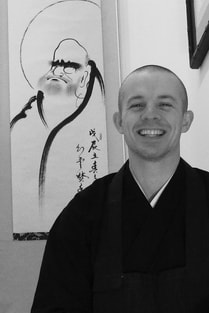
Dōju Layton
Getting Started in Zen Practice facilitator, Sunday dharma talks once a month Dōju grew up in the Washington D.C. area. He received an undergraduate degree from the College of William and Mary and a master's degree in evolutionary biology from the University of Missouri-St. Louis. While in the latter program, he began practicing zazen at the Missouri Zen Center in St. Louis after deciding against an academic career but lacking another clear direction. Inspired after reading Kōshō Uchiyama’s Opening the Hand of Thought, in 2015 he moved to Sanshinji in Bloomington to practice under Okumura Rōshi. Dōju was ordained as a novice priest in 2017. To supplement his priest training, Dōju studied Buddhism at Indiana University, receiving a master's degree in Religious Studies in 2021. He is interested in the intersection of practice, ecology, and politics, and how to engage with these topics while being true to the Buddhist tradition. Yuko Okumura
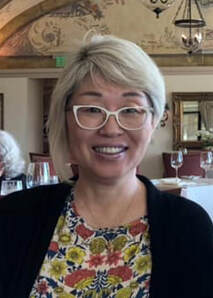
Yuko Okumura
Teacher of nyoho sewing of Buddha's robe Yuko started to practice zazen when she was 16 and later went to Komazawa University to study Buddhism. During her time there, she had an opportunity to learn nyoho-e style sewing. She received lay precepts from Kin-ei Otogawa Zenji at Sojiji in Japan in 1977. After being married to Shohaku Okumura in 1983, she lived at Antaiji for one year to study okesa sewing. Since Sanshinji's establishment in Bloomington, she has been helping lay people to sew their rakusu and ordained people to sew their okesa. In 2018 she led an online kesa study group where she shared the English translation of the book Study of Kesa by Kyuma Echu. Mark Myogen Ahlstrom
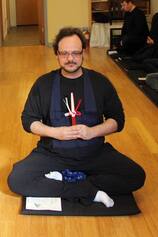
Mark Myōgen Ahlstrom
Friday morning jikido/doan In traditional American fashion, Mark came to Buddhism through a book, The Razor's Edge. He couldn't let go of the question of why Larry burned his books on the mountain top. He took refuge at the Karna Thegsum Choling Dallas with Lama Dudjom Dorjee under the Karma Kagyu school of Tibetan Buddhism in 2006. In 2007 he moved to his native home of Bloomington-Normal Illinois and joined the Bloomington-Normal Zen Group (The Dharma Wind Zen Center), which he eventually ran for about five years. There he met and took precepts with Zuiko Redding at Jikyouji in Cedar Rapids (2010). He took a job with IU as a Database Administrator in 2015, and started practicing at Sanshinji. There he tries to balance work-life and and zen-life and usually laughs at the idea -- as if there is a difference! Sawyer Jisho hitchcock
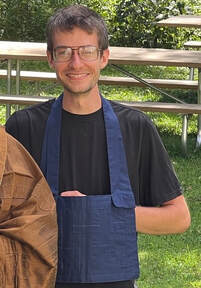
Sawyer Jisho Hitchcock
Operations manager, Monday & Tuesday morning jikido-doan Sawyer grew up primarily in central Indiana, and found his way to Sanshinji in Bloomington in 2016, while living at his family’s cabin house a half-hour away in Yellowwood State Forest. After dipping his toes into Zen practice at Sanshin, he spent several years in the Western U.S., working conservation internships and generally being enamored by the presence of mountains and a sense of wild nature in an ecologically wounded world. While living in Montana, he met Zenku Jerry Smyers of Mission Mountain Zen, from whom he eventually received a wagesa, lay precepts, and the dharma name Jisho in July of 2020. Later that year, Sawyer returned to southern Indiana, and since then his involvement with Sanshin has steadily increased by some strange dharma-magnetism. He lived at Sanshin as a resident from April through December of 2022 and found it deeply compelling to be a part of establishing residential practice here. He received lay precepts from Hoko Karnegis in July of 2023, retaining the name Jisho (compassion-nature). Following his residency, Sawyer was hired as Sanshin’s event coordinator and this year became its operations manager. As a part-time farmhand, he has found it meaningful to begin to develop relationships between Sanshin and nearby small, sustainably-minded farms, sourcing produce from the local community for the sesshin and retreats he helps to coordinate. He finds Sanshin’s mission of “investigating interconnectedness as it manifests in community” to be a profound and effective organizing principle for Soto Zen bodhisattva practice amidst the imbalances and opportunities of our modern world. He is grateful to also be able to explore Buddhism with his parents, with whom he first began to practice meditation in 2015. |
Policies and guidelines
About Diversity and Inclusion at Sanshin
Sanshin Zen Community is the natural fruit of people’s wish and aspiration to practice, study and deepen our way of life based on the Buddha’s and Dogen Zenji’s teachings. Following the intention of our founder, we make every effort to make Sanshin a healthy and wholesome organization without forgetting that the life of a practice center is nothing other than practice. Establishing and maintaining a healthy place to practice requires the participation of many people in the community, representing the diversity of backgrounds, nationalities, identities, and experiences of individuals interested in Buddhism. To this end, we encourage and welcome all who would like to engage with us in zazen, work, and study.
Our environmental Practice statement
Our zazen, precepts, and bodhisattva vows teach and embody interconnectedness. This means the entire ecological community is not separate from any individual self, human or nonhuman. It is thus a guiding principle and practice within Sanshin Zen Community’s daily functioning to deeply and sincerely reflect on the truth of interconnection when making decisions with an environmental impact. We aim to take all reasonable steps to minimize harmful impacts and to strive instead to actively contribute towards the ecological health of all beings. This will inform sangha actions related to facility construction, renovation, and energy use; stewardship of temple grounds; travel to and from temple activities; and general resource use and disposal (food, water, materials, fuels, etc.).
Check back soon for descriptions of some of the ways in which we aim to align our day to day practice and temple functioning with our aspirations for harmonious ecological relations, alongside resources for your own practice with the earth and all beings.
Check back soon for descriptions of some of the ways in which we aim to align our day to day practice and temple functioning with our aspirations for harmonious ecological relations, alongside resources for your own practice with the earth and all beings.
Ethics policy
Zendo guidelines
Registration and cancellation policies
Zendo stay and camping guidelines
Public health protocols
Zendo guidelines
Registration and cancellation policies
Zendo stay and camping guidelines
Public health protocols
Sanshin's board of directors
Voting membersJEFF SEIKAN ALBERTS
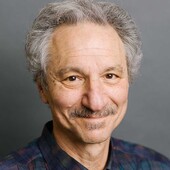
Jeff Seikan Alberts
Email Jeff Jeff is a professor of psychological and brain sciences at IU, where his particular areas of study include animal learning and behavior, behavioral neuroscience and developmental psychology. He's been practicing at Sanshin for several years, frequently participating in the Wednesday evening zazen/book group and the Sunday morning dharma talks. He took lay precepts at Sanshin in 2022. ZENKI BATSON
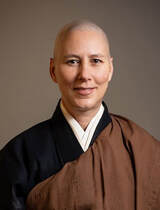
Zenki Batson
Email Zenki Zenki Kathleen Batson is a Soto Zen Buddhist priest in the lineage of Shunryu Suzuki and is Vice-Abbess of the Chapel Hill Zen Center in North Carolina. She grew up in metro Detroit and first tried meditating in sixth grade after reading Shunryu Suzuki’s book, Zen Mind, Beginner’s Mind. She began developing a consistent meditation practice in her early 20s and was introduced to Dogen’s writings in a college course on Taoism and Zen Buddhism taught by Tom Kasulis at Northland College. She first received the Precepts in 1995 at a retreat with Thich Nhat Hanh and first heard Okumura Roshi speak at MZMC in the 1990’s. She began practicing with her teacher Josho Pat Phelan in 2000. She received zaike tokudo in 2002, shukke tokudo in 2015, was shuso in 2019, and received Dharma transmission from her teacher on January 1, 2023. Zenki deeply appreciates Okumura Roshi’s work and has attended several of his Genzo-e retreats over the last two decades. In her free time, she enjoys making music and art and spending time camping and kayaking calm waters. She lives in Durham, NC with her husband, son, and a cat. GENE KISHIN ELIAS
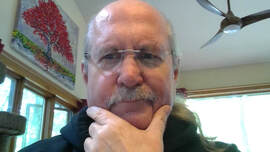
Gene Kishin Elias
Treasurer Email Gene The very day Gene finished his second reading of the biography Zen and the Art of Motorcycle Maintenance” by Robert Pirsig, he also got an advertisement for classes at the local community college. On the front page of the ad was a class called Introduction to Zen. He signed up for the class the same day and has been a student now for many years. The style of practice at Sanshin is a very simple but elegant form of practice, one that Gene finds very appealing. In 2018, he became a member of the Board of Directors, and then Treasurer – having the qualifications of an MBA in Finance. After serving 3+ years, he took some time off from the board, but rejoined in 2023 and now serves as your Treasurer once again. In 2022 he took lay precepts at Zenshuji in Los Angeles as part of the 100th anniversary of Soto Zen in North America. Gene resides in Southern Indiana where he studies Soto Zen and practices zazen both at his home in the Yellow Wood State Forest and with the Sanshin Zen Community sangha. MARK JO-E FRALEY
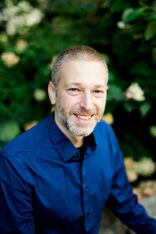
Mark Jo-e Fraley
Development Chair Email Mark Mark has been practicing at Sanshin for several years, frequently participating in the Wednesday evening zazen/book group and the Sunday morning dharma talks. He took lay precepts at Zenshuji in Los Angeles in 2022 as part of the 100th anniversary of Soto Zen in North America. Mark is the associate director of IU's Political and Civic Engagement program. He has a bachelor’s degree in Psychology and Philosophy/Neuroscience/Psychology from Washington University in St. Louis and a Master of Public Administration from University of Washington’s Evans School of Policy and Governance. He has extensive experience in community organizing, political campaigning, legislative relations, strategic communications, and non-profit management. MICHAEL KOMYO MELFI
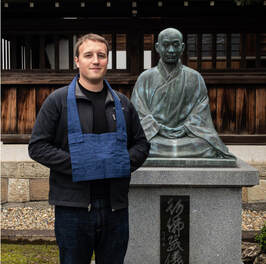
Michael Komyo Melfi
Chair Email Michael Michael Komyo Melfi is the primary organizer for Grove City Zen in Ohio. After gaining an interest in Buddhism in High School, Michael began reading and studying more in college and discovered Sanshin Zen Community in his backyard in Bloomington. He took precepts with Hoko Karnegis at Sanshin in Bloomington in 2019 receiving the Dharma name “Komyo” meaning ancient light. After leaving Bloomington and moving to the Columbus area he wanted to continue to practice Zen in the Sanshin style and give others the opportunity to do the same. Michael is currently a pre-novice under Hoko Karnegis, meaning that he is in the process of training and completing requirements to ordain as a novice monk in the Sanshin lineage. Michael studied History and Religious Studies at Indiana University and has a passion for studying Buddhist Philosophy and History. He lives in Grove City with his wife and fellow board member Laura Miller, and their two dogs. LAURA MILLER
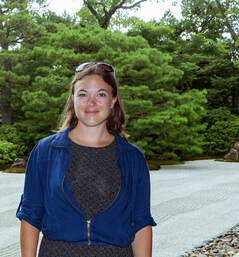
Laura Miller
Vice Chair Email Laura Laura graduated from Indiana University with a Masters of Public Health and holds a Masters Certificate in Public and Non-Profit Leadership from the Ohio State University, and has spent her career in social justice oriented non-profit leadership. She lives in Grove City, Ohio with her husband and fellow board member Komyo Melfi, and their two dogs. Laura began exploring Zen Buddhism in 2017 and enjoyed attending Sunday morning dharma talks at Sanshin prior to moving out of Bloomington. She currently practices with Grove City Zen in Columbus, Ohio. KARLA JIGEN PASSALACQUA
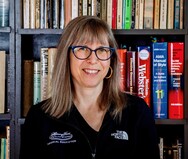
Karla Passalacqua
Secretary Email Karla Karla started practicing with Sanshin in 2016 and received lay precepts from Okumura Roshi in 2018. She has recently made a career change away from investigating microbes in the laboratory to her current role as Medical Writer & Editor in Medical Education at Henry Ford Hospital in Detroit. She has a Master’s degree in Painting from Wayne State University and a PhD in Microbiology & Immunology from the University of Michigan. Karla has experience practicing in the Korean Seon tradition, and she has been to India three times to teach biology at Tibetan Buddhist monasteries for the Emory-Tibet Science Initiative. A resident of Ann Arbor, Michigan, she is a bit of a bird and bug nut, a walking enthusiast, and a book lover. |
Non-voting membersEIDO REINHART
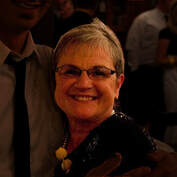
Eido Reinhart
Email Eido Inside lineage director Eido was raised as a Presbyterian, but as a young adult in the seventies her attraction to contemplative and monastic traditions led her to become a Roman Catholic. Influenced by Thomas Merton, she entered a Catholic contemplative monastery (Sisters of St Clare) from 1979 to 1980. Before this she had become acquainted with Zen meditation, and it became her prayer posture. She participated in sesshin with Dainin Katagiri Roshi in Minnesota. During this time another important influence was the early version of what would become Kosho Uchiyama’s Opening the Hand of Thought. She followed these parallel Christian and Zen paths (Christian and Zen) for many years and much of her zazen practice was on her own. After leaving the Catholic monastery she participated in a summer seichu (practice period) at Mount Baldy in California, a Rinzai practice center started by Joshu Sasaki Roshi, who was in residence at that time. He also wrote a book called “Buddha is the Center of Gravity’ which included the significant statement “There is no God but he [she] is always with you.” She returned to her life in Minneapolis where she worked as a physical therapist for 50 years. In the eighties she got married and had two sons and later, two granddaughters. She lived in Juneau (AK) from 1985 to 1992 and there was no Zen practice going on there. She continued her parallel paths (Catholic and Zen) but the Zen practice was mostly private except for attending a week-end sesshin annually at Minnesota Zen Center when she visited family and friends in Minneapolis. After Katagiri Roshi died she returned to MZMC in 1993 to discover that Shohaku Okumura was the temporary abbot. Eventually she chose him as her teacher, practicing at MZMC while he was there and for several years beyond that. She received lay precepts from him, then ordination as a novice and eventually transmission. Eido participated in two three-month angos in Japan (2013 and 2016), participated in zuisse in Japan and is recognized by Sotoshu as kokusai fukyoushi (international teacher/missionary). Mark Pfaff
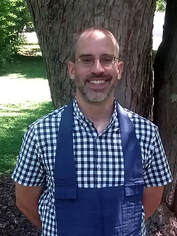
Mark Pfaff
Past President Email Mark Mark was a voting member of the board from 2009 to 2019 and now serves in an advisory capacity for development and technology. He received the precepts from Okumura Roshi in 2001. From 2001 to 2004, he served on the board of Stillpoint, a Soto Zen practice community in Pittsburgh, PA, where he was the leader of the gardening crew, a member of the outreach community, and webmaster. When he first joined Sanshin's board of directors, Mark focused on our communication and technology resources supporting the local and global Sanshin community. He served as board secretary from 2010 until serving as president from 2017 to 2019. Over his career, Mark has worked in many different fields, including photography, music, and media production. Since 2008, he has worked as a researcher of the human experience of using complex technology. |

